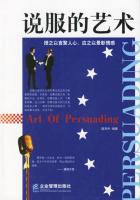Now I saw that he was getting angry with me for drawing distinctions, when he wanted to catch me in his springes of words. And I remembered that Connus was always angry with me when I opposed him, and then he neglected me, because he thought that I was stupid; and as I was intending to go to Euthydemus as a pupil, I reflected that I had better let him have his way, as he might think me a blockhead, and refuse to take me. So I said: You are a far better dialectician than myself, Euthydemus, for I have never made a profession of the art, and therefore do as you say; ask your questions once more, and I will answer.
Answer then, he said, again, whether you know what you know with something, or with nothing.
Yes, I said; I know with my soul.
The man will answer more than the question; for I did not ask you, he said, with what you know, but whether you know with something.
Again I replied, Through ignorance I have answered too much, but I hope that you will forgive me. And now I will answer simply that I always know what I know with something.
And is that something, he rejoined, always the same, or sometimes one thing, and sometimes another thing?
Always, I replied, when I know, I know with this.
Will you not cease adding to your answers?
My fear is that this word 'always' may get us into trouble.
You, perhaps, but certainly not us. And now answer: Do you always know with this?
Always; since I am required to withdraw the words 'when I know.'
You always know with this, or, always knowing, do you know some things with this, and some things with something else, or do you know all things with this?
All that I know, I replied, I know with this.
There again, Socrates, he said, the addition is superfluous.
Well, then, I said, I will take away the words 'that I know.'
Nay, take nothing away; I desire no favours of you; but let me ask: Would you be able to know all things, if you did not know all things?
Quite impossible.
And now, he said, you may add on whatever you like, for you confess that you know all things.
I suppose that is true, I said, if my qualification implied in the words 'that I know' is not allowed to stand; and so I do know all things.
And have you not admitted that you always know all things with that which you know, whether you make the addition of 'when you know them' or not? for you have acknowledged that you have always and at once known all things, that is to say, when you were a child, and at your birth, and when you were growing up, and before you were born, and before the heaven and earth existed, you knew all things, if you always know them; and I swear that you shall always continue to know all things, if I am of the mind to make you.
But I hope that you will be of that mind, reverend Euthydemus, I said, if you are really speaking the truth, and yet I a little doubt your power to make good your words unless you have the help of your brother Dionysodorus;then you may do it. Tell me now, both of you, for although in the main Icannot doubt that I really do know all things, when I am told so by men of your prodigious wisdom--how can I say that I know such things, Euthydemus, as that the good are unjust; come, do I know that or not?
Certainly, you know that.
What do I know?
That the good are not unjust.
Quite true, I said; and that I have always known; but the question is, where did I learn that the good are unjust?
Nowhere, said Dionysodorus.
Then, I said, I do not know this.
You are ruining the argument, said Euthydemus to Dionysodorus; he will be proved not to know, and then after all he will be knowing and not knowing at the same time.
Dionysodorus blushed.
I turned to the other, and said, What do you think, Euthydemus? Does not your omniscient brother appear to you to have made a mistake?
What, replied Dionysodorus in a moment; am I the brother of Euthydemus?
Thereupon I said, Please not to interrupt, my good friend, or prevent Euthydemus from proving to me that I know the good to be unjust; such a lesson you might at least allow me to learn.
You are running away, Socrates, said Dionysodorus, and refusing to answer.
No wonder, I said, for I am not a match for one of you, and a fortiori Imust run away from two. I am no Heracles; and even Heracles could not fight against the Hydra, who was a she-Sophist, and had the wit to shoot up many new heads when one of them was cut off; especially when he saw a second monster of a sea-crab, who was also a Sophist, and appeared to have newly arrived from a sea-voyage, bearing down upon him from the left, opening his mouth and biting. When the monster was growing troublesome he called Iolaus, his nephew, to his help, who ably succoured him; but if my Iolaus, who is my brother Patrocles (the statuary), were to come, he would only make a bad business worse.
And now that you have delivered yourself of this strain, said Dionysodorus, will you inform me whether Iolaus was the nephew of Heracles any more than he is yours?
I suppose that I had best answer you, Dionysodorus, I said, for you will insist on asking--that I pretty well know--out of envy, in order to prevent me from learning the wisdom of Euthydemus.
Then answer me, he said.
Well then, I said, I can only reply that Iolaus was not my nephew at all, but the nephew of Heracles; and his father was not my brother Patrocles, but Iphicles, who has a name rather like his, and was the brother of Heracles.
And is Patrocles, he said, your brother?
Yes, I said, he is my half-brother, the son of my mother, but not of my father.
Then he is and is not your brother.
Not by the same father, my good man, I said, for Chaeredemus was his father, and mine was Sophroniscus.
And was Sophroniscus a father, and Chaeredemus also?
Yes, I said; the former was my father, and the latter his.
Then, he said, Chaeredemus is not a father.
He is not my father, I said.
But can a father be other than a father? or are you the same as a stone?
I certainly do not think that I am a stone, I said, though I am afraid that you may prove me to be one.
Are you not other than a stone?
I am.
And being other than a stone, you are not a stone; and being other than gold, you are not gold?
Very true.














